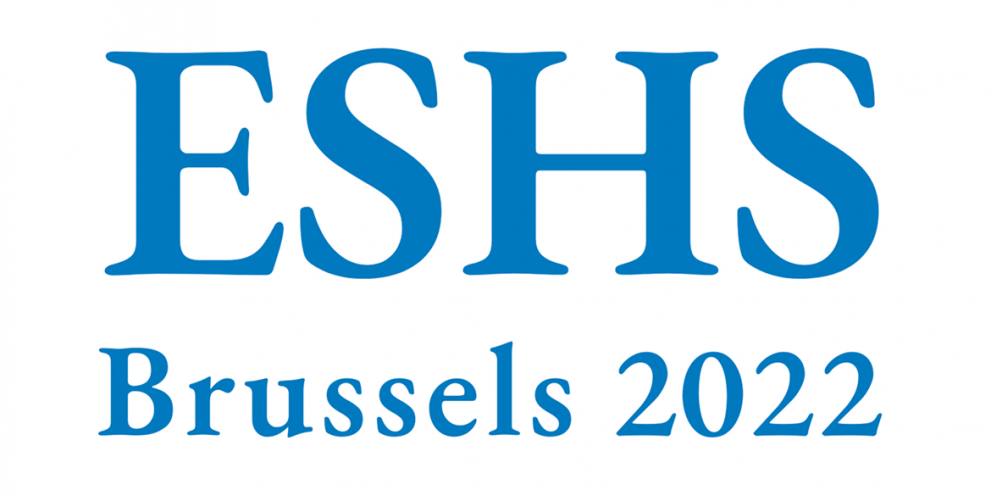10th ESHS Conference Brussels 2022
Kateřina Lišková, Natalia Jarska, and Annina Gagyiova presented at the 10th ESHS Conference which took place on 7-10th September 2022 in Brussel, Belgium.
Experts, children and the state. The establishment and early activity of the Institute of Mother and Child in state socialist Poland (late 1940s to 1960s) - presented by Natalia Jarska.
This paper explores the history of mother and child healthcare in postwar Poland, focusing on the key institution established in 1948: the Institute of Mother and Child. The creation of the Institute responded to urgent needs to improve children’s health heavily impacted by the war and occupation, and to struggle with extremely high infant mortality, as well as fulfilled the pronatalist goals of the early state socialist Poland. Based on published materials such as professional medical journals and books, and archival documents, the paper will analyze the process of the establishment of the Institute and the shaping of its research and practical activities from the late 1940s to 1960s. During the first decade, the Institute focused on reducing birth-related, infant and child mortality and the establishment of standards of care for pregnant women. It developed research activity in areas such as care for premature babies and nutrition. From the early 1960s on, the Institute further expanded research on developmental age, and developed broad international and transnational contacts. Using the case of the Institute of Mother and Child, the paper aims to trace the role of medical doctors in the shaping of healthcare for women and children in the postwar period, underscoring the agency of scientists and experts under state socialism, beyond the dominant image of top-down politics of science in this period.
Maternal bond and the healthy child. Transnational knowledge and its application in one socialist country (the 1950s-60s) - presented by Kateřina Lišková.
In the early postwar years, ideas about the necessity of the mother’s presence and care for the future health of her child became established. On the transnational level, the years 1951-2 marked a publication of a two-part report on “Maternal care and mental health” prepared for the World Health Organization (WHO) by the psychologist John Bowlby. WHO tasked Bowlby with mapping the fate of children in war-torn Europe. What he came up with was to highlight the absolute necessity of a warm, intimate connection between the mother and the child to develop so that children grow up to be mentally healthy.
A decade later, the ideas about “emotional deprivation” of children became resonating in one country of the Eastern bloc: Czechoslovakia. There, developmental psychologists together with pediatricians warned against dire consequences awaiting children who spent their early years in institutional care. By 1963 when a Czechoslovak documentary “Children without love” was made, “institutional care” encompassed not only hospitals and orphanages but also nurseries and kindergartens.
Based on published expert writings (WHO) and scholarly monographs together with family policies (Czechoslovakia), I will analyze expert ideas about the importance of maternal care. I will show how the same recommendations emerged from different social situations (postwar child homelessness vs. socialist collectivized childcare) and produced divergent outcomes (changed practices of care in institutional settings vs. renewed focus on women-as-mothers, not workers). In particular, expert authority accentuating the mother and her irreplaceability inspired policy changes that led to the re-traditionalizing of gender ideas in socialist Czechoslovakia.
Every Child According to Its Pace: School Maturity at the Crossroad of Psycho-Pedagogical Expertise and State Policies in Socialist Hungary (1960s - 1980s) - presented by Annina Gagyiova.
State socialist societies and their governments understood the successful school trajectory of children as being central to the building of socialism. From the 1960s on, Hungarian experts developed reliable ways of assessing school maturity which was supposed to be decisive for the future learning performance of the young student. Pedagogues, psychologists and paediatricians expressed diverse views on how to assess school maturity and how to translate the results into effective and pragmatic solutions on the ground. During the 1970s, experts started not only to take the physical and mental condition of the child into account but to consider the social and economic situation of the parents as well.
In order to obtain more insight on the subject the paper will draw on an array of sources, starting with experts’ discourses in specialised journals, archival material on the party’s position as well as the discourse presented to the wider public in popular publications.
Ultimately, this contribution aims to shed light on the question how experts of various disciplines shaped the socialist school system and therefore the modernisation achievements of socialist Hungary. While the expert discussion on school maturity was meant to overcome previous class divisions the paper will also ask if certain research categories used by experts pointed to a silent (re-)introduction of class in the supposedly classless society.



